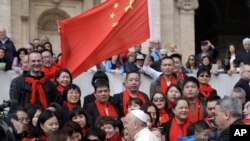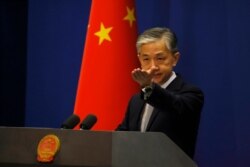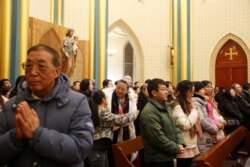The Vatican and China are expected to renew a deal on the appointment of Catholic bishops in China, despite U.S. pressure for the Holy See to take a more critical position on Beijing.
Citing a senior Vatican source, the Reuters News Agency said Pope Francis has signed off on the two-year extension of the original pact that took effect in 2018, which gave the pope the final say on the appointment of bishops in China.
China has also signaled willingness to renew the provisional deal. Chinese Foreign Ministry spokesman Wang Wenbin said Tuesday, "the two sides will continue to maintain close communication and consultation and improve bilateral relations."
U.S. Secretary of State Mike Pompeo urged the Vatican to take a more critical position with the Chinese Communist region because the human rights situation in China has deteriorated severely under Xi Jinping.
"It's clear that the Sino-Vatican agreement has not shielded Catholics from the Party's depredations, to say nothing of the Party's horrific treatment of Christians, Tibetan Buddhists, Falun Gong devotees, and other religious believers," Pompeo said in an article published in U.S. religious magazine First Things last week.
"The Vatican endangers its moral authority, should it renew the deal," he added on Twitter.
Pompeo is expected to meet Pope Francis when he visits Rome at the end of the month.
12 million Chinese Catholics
China has roughly 12 million Catholics. They are traditionally split between a government-run association and an unofficial underground church loyal to the pope.
The two sides reached a provisional agreement in September 2018, giving both Beijing and the Vatican a say in appointing Catholic bishops in China.
The exact content of the deal was never published, yet both sides now recognize the pope as supreme leader of the Catholic Church.
Ji Shuoming, a Chinese journalist now based in Hong Kong, told VOA that the Vatican has made compromises in order to continue its engagement with the Beijing government.
"Vatican hopes that through engagement, it can spread its value and voices to believers in China," he said, "It contradicts the U.S. approach of using decoupling as a tool to step up its pressure on China."
He indicated that he supports the engagement tactic, saying no matter what tactic one chooses, the ultimate goal is "to sit down and negotiate with China."
Liu Bainian, honorary chairman of the state-run Chinese Catholic Patriotic Association, told VOA he supports continuing the deal.
"Our mission is to spread the gospel, whether it's in China or anywhere else. I don't think politics should play a part in it," he said.
Critics: 'Selling out' to China
Conservative members of the church, including former archbishop of Hong Kong Cardinal Joseph Zen, have accused the Vatican of selling out to China. Vatican officials admit the China deal was not perfect, but it gives the church "a direct channel for dialogue with Beijing after a break of nearly 70 years."
Father Bernardo Cervellera, one of the Catholic Church's leading experts on China affairs, recently told religious news site Cruxnow.com that the initial deal had so far borne "very little fruit," and said he hopes the Vatican would be tougher on China when renewing the agreement.






